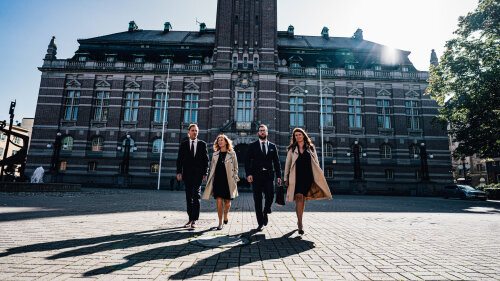Best Collaborative Law Lawyers in Norrköping
Share your needs with us, get contacted by law firms.
Free. Takes 2 min.
Free Guide to Hiring a Family Lawyer
List of the best lawyers in Norrköping, Sweden
About Collaborative Law in Norrköping, Sweden
Collaborative Law is a voluntary, problem solving approach for people who want to resolve family and relationship disputes without going to court. Each party retains their own lawyer who is trained in interest based negotiation. Everyone signs a written participation agreement to work toward a settlement through transparent information sharing, respectful communication, and a focus on practical solutions. Sessions can also include neutral professionals such as financial specialists, child experts, or family coaches to help the parties make informed, child focused and financially sound decisions.
In Sweden, family law is national, so the legal rules are the same in Norrköping as elsewhere in the country. What is local is access to municipal family services. In Norrköping, the municipal family law unit offers cooperation talks for parents and can approve agreements concerning custody, residence, and contact with children. Collaborative Law fits well with these services because it encourages early resolution, prioritizes the best interests of the child, and aims to produce durable agreements that can be approved and made enforceable when required.
Why You May Need a Lawyer
A lawyer experienced in Collaborative Law helps you understand your rights and options, reduces conflict, keeps discussions focused on solutions, and drafts clear agreements that hold up over time. People in Norrköping typically seek legal help for collaborative matters in situations such as divorce or separation, disputes about custody, residence, and contact, child support and spousal maintenance, division of marital property, separation of cohabitants under the Cohabitees Act, and cross border family issues that affect children, finances, or relocation.
Lawyers also assess whether a collaborative process is appropriate. If there is a significant power imbalance, coercive control, or domestic violence, the collaborative route may not be safe or suitable. In urgent situations, for example when a child is at risk or a unilateral relocation is imminent, you may need court orders rather than a voluntary process. A local lawyer can help you choose the right path and coordinate with municipal services and the district court when needed.
Local Laws Overview
Swedish family law is set out in national legislation that applies in Norrköping. The following areas are especially relevant to collaborative matters.
Children and parental responsibility. The Parental Code governs custody, residence, and contact. The court and municipal family services must prioritize the child’s best interests. Parents can reach their own agreement. If the social welfare committee in Norrköping approves the agreement, it becomes enforceable in the same way as a court judgment.
Marriage and divorce. The Marriage Code governs divorce, spousal maintenance, and division of property between spouses. Some divorces require a six month consideration period. Couples can resolve property and maintenance collaboratively and record the outcome in a written settlement. Lawyers ensure that the agreement is legally sound and consistent with mandatory protections.
Cohabitees. The Cohabitees Act regulates division of joint home and household goods when unmarried partners separate. Collaborative discussions can help define what is included and how to value and divide it, or agree on buyouts and timelines.
Municipal family services in Norrköping. The municipality offers cooperation talks for parents and can review and approve written agreements on custody, residence, and contact if they are consistent with the child’s best interests. These services are separate from the court and are often used alongside or after collaborative negotiations.
Courts and enforceability. If you reach a collaborative settlement about children, you can request approval by the social welfare committee or, if a case is in court, ask the district court to confirm it. Financial agreements between adults generally bind the parties once properly drafted and signed. Some arrangements may benefit from additional steps for clarity and future enforcement. A lawyer can explain what is needed in your situation.
Confidentiality and data protection. Collaborative sessions are private by agreement between the participants and professionals. Confidentiality stems from contracts and professional secrecy rules, and it has legal limits. Personal data must be handled according to the EU General Data Protection Regulation and Swedish data protection rules. Municipal family services are subject to confidentiality rules in the Social Services Act and the Public Access to Information and Secrecy Act.
Ethics and representation. Swedish lawyers are bound by the Swedish Bar Association’s ethical rules. A core feature of Collaborative Law is that if the process breaks down, the collaborative lawyers withdraw and do not take the case to court. This encourages problem solving in good faith and helps maintain a constructive environment.
Frequently Asked Questions
What is the difference between Collaborative Law and mediation?
In mediation, a neutral mediator facilitates talks and does not represent either party. In Collaborative Law, each party has their own lawyer trained to problem solve rather than litigate, and everyone commits to settle without court. Many families use both approaches at different stages, depending on their needs.
Is Collaborative Law recognized in Sweden?
Yes in the sense that it is a lawful, voluntary process based on contract and professional ethics. There is no special statute for Collaborative Law, but its outcomes can be turned into legally binding agreements and, where appropriate, approved by the social welfare committee or the court.
Who participates in a collaborative case?
Each party and their collaborative lawyer. By agreement, neutral professionals can join, such as a child specialist to bring the child’s perspective, a financial neutral to model options and tax, or a coach to support communication and planning.
How long does the collaborative process take?
It varies with complexity and the level of conflict. Many families resolve core issues within two to five joint sessions over a few months. Adding financial analysis, property valuations, or child consultations can extend the timeline, but the process is typically shorter than contested court proceedings.
Are the agreements legally binding?
Yes, if properly drafted and signed. Agreements about custody, residence, and contact can be submitted for approval to the social welfare committee in Norrköping, which makes them enforceable. Financial and property agreements between adults are binding under general contract principles, subject to mandatory protections. Your lawyer will ensure the correct form and steps.
What happens if the process fails?
If either party ends the process, the collaborative lawyers withdraw and cannot represent the parties in court. Each person may then hire litigation counsel. This structure motivates everyone to stay solution focused during collaboration.
Is Collaborative Law suitable if there has been domestic violence?
Safety comes first. Where there is domestic violence, coercion, or significant fear, a court based approach with protective measures is often more appropriate. A lawyer can assess risk, discuss restraining orders, and coordinate with social services. Collaborative Law requires both parties to participate freely and safely.
Can we address all issues in one collaborative process?
Yes. Parents and partners commonly resolve custody, residence, contact schedules, child support, spousal maintenance, and division of property within one coordinated process. Neutral experts can be brought in to help with pensions, housing, taxes, and child focused planning.
How are the children’s views taken into account?
The child’s best interests are paramount under Swedish law. In collaboration, parents can work with a neutral child specialist or use municipal cooperation talks to understand the child’s needs and, when appropriate, their wishes. Agreements must be consistent with the child’s best interests to be approved.
What does it cost compared to going to court?
Collaborative cases involve professional fees for lawyers and any neutrals. Costs are usually more predictable and often lower than a contested court case because the process avoids litigation steps. Ask about fee structures, potential use of legal protection under your home insurance, and eligibility for legal aid.
Additional Resources
Norrköping Municipality Family Law Unit. Offers cooperation talks for parents and processes approvals of agreements on custody, residence, and contact when consistent with the child’s best interests.
Norrköping District Court. Handles family cases when court involvement is necessary and can confirm settlements reached during proceedings.
Swedish Bar Association. Provides information about finding a lawyer with family law and collaborative practice experience.
Swedish National Courts Administration. General guidance on court processes in family matters.
Swedish Social Insurance Agency. Information about maintenance support and calculations that can help inform child support discussions.
Swedish Enforcement Authority. Guidance on enforcing maintenance claims if needed.
Swedish Tax Agency. Information relevant to property division, real estate, capital gains, and registration issues that may arise in settlements.
Municipal family counseling services in Norrköping. Professional relationship counseling that can complement collaborative work by improving communication and co parenting skills.
Local support services for victims of crime and domestic violence. For safety planning and support if there are concerns about violence or control.
Next Steps
Clarify your goals. Write down what matters most to you, your practical concerns, and any urgent issues that cannot wait. Consider whether you and the other party can commit to a voluntary, transparent process focused on settlement.
Consult a lawyer experienced in Collaborative Law in Norrköping. Ask about their training, how sessions are structured, expected timelines and costs, and how they work with neutral professionals. Discuss whether collaboration is appropriate in your circumstances.
Plan the process. If you both agree to collaborate, you will sign a participation agreement that sets the ground rules, confidentiality terms, and the commitment not to go to court during the process. Your lawyer will explain the implications and any exceptions for emergencies.
Prepare information. Gather documents such as income, budgets, debts, property values, pension statements, and calendars for parenting schedules. Accurate information speeds up negotiations and reduces misunderstandings.
Use local services. For parenting issues, contact the municipal family law unit for cooperation talks and, when ready, for approval of any agreement concerning custody, residence, or contact. This can make your agreement enforceable and child focused.
Finalize and implement. Your lawyer will draft the settlement documents in clear language. Where required, agreements will be submitted for approval. Create a practical plan for timelines, payments, property transfers, and how to address future changes.
Consider funding options. Ask your lawyer to assess legal protection under your home insurance and eligibility for state legal aid. Understanding cost coverage early helps you plan the process confidently.
If collaboration is not suitable or breaks down, seek advice promptly on court options, interim measures, and safety. A timely response can protect children, finances, and rights while keeping the door open to settlement when possible.
Lawzana helps you find the best lawyers and law firms in Norrköping through a curated and pre-screened list of qualified legal professionals. Our platform offers rankings and detailed profiles of attorneys and law firms, allowing you to compare based on practice areas, including Collaborative Law, experience, and client feedback.
Each profile includes a description of the firm's areas of practice, client reviews, team members and partners, year of establishment, spoken languages, office locations, contact information, social media presence, and any published articles or resources. Most firms on our platform speak English and are experienced in both local and international legal matters.
Get a quote from top-rated law firms in Norrköping, Sweden — quickly, securely, and without unnecessary hassle.
Disclaimer:
The information provided on this page is for general informational purposes only and does not constitute legal advice. While we strive to ensure the accuracy and relevance of the content, legal information may change over time, and interpretations of the law can vary. You should always consult with a qualified legal professional for advice specific to your situation.
We disclaim all liability for actions taken or not taken based on the content of this page. If you believe any information is incorrect or outdated, please contact us, and we will review and update it where appropriate.










